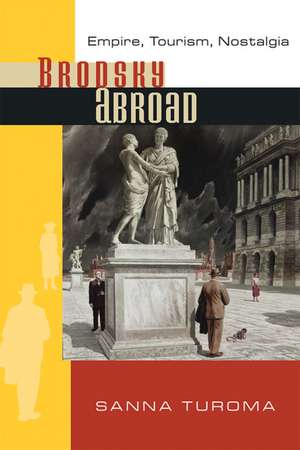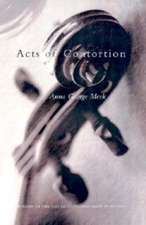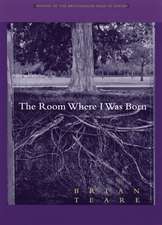Brodsky Abroad: Empire, Tourism, Nostalgia
Autor Sanna Turomaen Limba Engleză Paperback – 25 mai 2010
Expelled from the Soviet Union in 1972 and honored with the Nobel Prize fifteen years later, poet Joseph Brodsky in many ways fit the grand tradition of exiled writer. But Brodsky’s years of exile did not render him immobile: though he never returned to his beloved Leningrad, he was free to travel the world and write about it. In Brodsky Abroad, Sanna Turoma discusses Brodsky’s poems and essays about Mexico, Brazil, Turkey, and Venice. Challenging traditional conceptions behind Brodsky’s status as a leading émigré poet and major descendant of Russian and Euro-American modernism, she relocates the analysis of his travel texts in the diverse context of contemporary travel and its critique. Turoma views Brodsky’s travel writing as a response not only to his exile but also to the postmodern and postcolonial landscape that initially shaped the writing of these texts.
In his Latin American encounters, Brodsky exhibits disdain for third-world politics and invokes the elegiac genre to reject Mexico’s postcolonial reality and to ironically embrace the romanticism of an earlier Russian and European imperial age. In an essay on Istanbul he assumes Russia’s ambiguous position between East and West as his own to negotiate a distinct, and controversial, interpretation of Orientalism. And, Venice, the emblematic tourist city, becomes the site for a reinvention of his lyric self as more fluid, hybrid, and cosmopolitan.
Brodsky Abroad reveals the poet’s previously uncharted trajectory from alienated dissident to celebrated man of letters and offers new perspectives on the geopolitical, philosophical, and linguistic premises of his poetic imagination.
In his Latin American encounters, Brodsky exhibits disdain for third-world politics and invokes the elegiac genre to reject Mexico’s postcolonial reality and to ironically embrace the romanticism of an earlier Russian and European imperial age. In an essay on Istanbul he assumes Russia’s ambiguous position between East and West as his own to negotiate a distinct, and controversial, interpretation of Orientalism. And, Venice, the emblematic tourist city, becomes the site for a reinvention of his lyric self as more fluid, hybrid, and cosmopolitan.
Brodsky Abroad reveals the poet’s previously uncharted trajectory from alienated dissident to celebrated man of letters and offers new perspectives on the geopolitical, philosophical, and linguistic premises of his poetic imagination.
Preț: 258.73 lei
Nou
Puncte Express: 388
Preț estimativ în valută:
49.51€ • 51.82$ • 41.21£
49.51€ • 51.82$ • 41.21£
Carte tipărită la comandă
Livrare economică 31 martie-14 aprilie
Preluare comenzi: 021 569.72.76
Specificații
ISBN-13: 9780299236342
ISBN-10: 029923634X
Pagini: 280
Dimensiuni: 152 x 229 x 18 mm
Greutate: 0.45 kg
Ediția:1
Editura: University of Wisconsin Press
Colecția University of Wisconsin Press
ISBN-10: 029923634X
Pagini: 280
Dimensiuni: 152 x 229 x 18 mm
Greutate: 0.45 kg
Ediția:1
Editura: University of Wisconsin Press
Colecția University of Wisconsin Press
Recenzii
“Instead of focusing on Brodsky’s political martyrdom, Brodsky Abroad brings together concepts of travel and exile.”—Bozena Shallcross, University of Chicago
“Thoroughly researched and elegantly written, Brodsky Abroad takes works of the leading representatives of postcolonial and postmodern theory and applies them to Brodsky’s travel writings before and after exile to the West.”—David M. Bethea, University of Wisconsin–Madison
“Sanna Turoma’s study of the role of travel in Joseph Brodsky’s writings is extremely welcome. The title does not reflect the depth and complexity of the book. A substantial number of Brodsky’s poems and essays deal with travel, displacement, exile, and simple tourism. This kind of cultural geography needed to be addressed. Dr. Turoma looked at not only these writings but also at extensive literature about travel, both theoretical and specific to Russia. As a result we have a book that is comprehensive, very interesting, and provocative.”—Irena Grudzinska Gross, Canadian Slavonic Papers
“She writes broadly . . . producing powerful interpretative arguments that convincingly incorporate large numbers of texts and point toward compelling paths for other interpreters.”—Slavic Review
“This complex, multilayered, and well-composed book makes Brodsky’s texts shine brighter.”—Slavic and East European Journal
“Dr. Turoma looked not only at these writings but also at extensive literature about travel, both theoretical and specific to Russia. As a result we have a book that is comprehensive, very interesting, and provocative.”—Canadian Slavonic Papers
“A gem of meticulous research, Turoma’s poem-by-poem analysis of the travel writing of Russian transplant and Nobel Prize winner Joseph Brodsky adds to the growing literature on literary travel writing.”—Choice
“A great contribution to the existing literature on postcolonial writing, with its discussion of the dilemma of East European emigrants both excited by Western cultural and economic prominence and [denying] its claims for hegemony.”—Ab Imperio: Studies of New Imperial History and Nationalism in the Post-Soviet Space
Notă biografică
Sanna Turoma is research fellow at the Aleksanteri Institute (Finnish Centre for Russian and Eastern European Studies) at the University of Helsinki. She is coauthor of the first Finnish-language textbook of the history of Russian literature.
Cuprins
Acknowledgments
Note on Translations and Abbreviations
Introduction
1. Exile, Tourist, Traveler
2. A Travel Guide to Imperial Mythologies: Leningrad
3. A Postcolonial Elegy: Mexico
4. The Metropolitan Man and the Third World: Rio de Janeiro
5. Time, Space, and Orientalism: Istanbul
6. Staging Cultural Differences: Venice
Conclusion
Notes
Bibliography
Index
Note on Translations and Abbreviations
Introduction
1. Exile, Tourist, Traveler
2. A Travel Guide to Imperial Mythologies: Leningrad
3. A Postcolonial Elegy: Mexico
4. The Metropolitan Man and the Third World: Rio de Janeiro
5. Time, Space, and Orientalism: Istanbul
6. Staging Cultural Differences: Venice
Conclusion
Notes
Bibliography
Index
Descriere
Expelled from the Soviet Union in 1972 and honored with the Nobel Prize fifteen years later, poet Joseph Brodsky in many ways fit the grand tradition of exiled writer. But Brodsky’s years of exile did not render him immobile: though he never returned to his beloved Leningrad, he was free to travel the world and write about it. In Brodsky Abroad, Sanna Turoma discusses Brodsky’s poems and essays about Mexico, Brazil, Turkey, and Venice. Challenging traditional conceptions behind Brodsky’s status as a leading émigré poet and major descendant of Russian and Euro-American modernism, she relocates the analysis of his travel texts in the diverse context of contemporary travel and its critique. Turoma views Brodsky’s travel writing as a response not only to his exile but also to the postmodern and postcolonial landscape that initially shaped the writing of these texts.
In his Latin American encounters, Brodsky exhibits disdain for third-world politics and invokes the elegiac genre to reject Mexico’s postcolonial reality and to ironically embrace the romanticism of an earlier Russian and European imperial age. In an essay on Istanbul he assumes Russia’s ambiguous position between East and West as his own to negotiate a distinct, and controversial, interpretation of Orientalism. And, Venice, the emblematic tourist city, becomes the site for a reinvention of his lyric self as more fluid, hybrid, and cosmopolitan.
Brodsky Abroad reveals the poet’s previously uncharted trajectory from alienated dissident to celebrated man of letters and offers new perspectives on the geopolitical, philosophical, and linguistic premises of his poetic imagination.
In his Latin American encounters, Brodsky exhibits disdain for third-world politics and invokes the elegiac genre to reject Mexico’s postcolonial reality and to ironically embrace the romanticism of an earlier Russian and European imperial age. In an essay on Istanbul he assumes Russia’s ambiguous position between East and West as his own to negotiate a distinct, and controversial, interpretation of Orientalism. And, Venice, the emblematic tourist city, becomes the site for a reinvention of his lyric self as more fluid, hybrid, and cosmopolitan.
Brodsky Abroad reveals the poet’s previously uncharted trajectory from alienated dissident to celebrated man of letters and offers new perspectives on the geopolitical, philosophical, and linguistic premises of his poetic imagination.












![Alternative Anthem [With DVD]: The Hag of Beara](https://i3.books-express.ro/bt/9781852248239/alternative-anthem-with-dvd.jpg)
